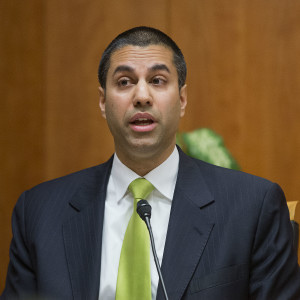The Federal Communications Commission reeled in one of numerous net neutrality rules passed under the Obama administration Thursday, a move Democrats blasted and Republicans alluded was the first of many.
In a 2-1 vote Republicans passed a five-year exemption to enhanced transparency rules included in the FCC’s 2015 net neutrality rules. The waiver exempts internet service providers (ISPs) with 250,000 or fewer subscribers from disclosing monthly data charges, promotional rates, data caps and network performance to their customers.
That includes what consumer groups describe as hidden fees often associated with equipment rentals, maintenance, activation and termination surcharges.
“I firmly believe that these ISPs should spend their limited capital building out broadband to rural America, not hiring lawyers and accountants to fill out unnecessary paperwork demanded by Washington, D.C.,” Pai said before calling for the vote.
Pai circulated the proposal shortly after taking over as chairman last month. That came after a similar exemption for subscribers with 100,000 or fewer subscribers extended twice by former FCC Chairman Tom Wheeler expired in December. Wheeler recirculated the exemption for renewal, but Republicans disagreed on the size of businesses that should be exempted.
“That lapse left thousands of our nation’s smallest and most competitive internet service providers – mom-and-pop wireless internet service providers, small cable operators, municipal broadband providers, electric cooperatives, rural telephone companies, and others – worried that they would be subject to unnecessary, onerous, and ill-defined reporting obligations,” Pai said at the time.
Thursday’s order mirrors legislation passed unanimously by the House of Representatives last year. Small network operators testified before Congress last year, saying they lack the resources larger providers like Comcast or Verizon can spend to ensure compliance. Forcing them to spend limited resources to comply with the rules, they explained, would prevent them from expanding and improving their networks.
Commissioner Mignon Clyburn, the only Democrat and only commissioner to vote for net neutrality left at the FCC, slammed the move as a boon for big internet providers that will ultimately hurt consumers.
“In an ongoing quest to dismantle basic consumer protections for broadband services, the majority has decided to exempt billion-dollar public companies from being transparent with consumers,” Clyburn said in dissent before the vote.
The Democrat cited an Office of Management and Budget analysis of the rules calculating compliance would take each broadband provider 6.8 hours annually.
Clyburn argued the exemption will let the biggest broadband providers in the U.S. exempt their subsidiaries from disclosing hidden fees to consumers “by declining to aggregate the connection count at the holding company level.”
“I could not compromise on having consumers clearly know the price they pay for service, what below-the-line fees are charged and what data allowances apply to their broadband service,” she said, adding she couldn’t support any rollback of net neutrality with the rules at large under threat of repeal by her Republican colleagues.
O’Rielly said the new exemption only applies to approximately 17 more wireline broadband providers than the previous exemption of companies with 100,000 or fewer subscribers. He hinted other net neutrality rules could face the same fate soon.
“To be clear, it does not address a far more fundamental matter — whether these reporting requirements should exist at all,” O’Rielly said. “That will have to wait for another day in the near future.”
In a press conference following the meeting Pai again said he wasn’t ready to make news with his plans for net neutrality, and that his office is still studying the legal landscape and “full range of options.”
The chairman added he’ll defer to Congress on its plan to reign in net neutrality privacy rules with the Congressional Review Act, another effort staunchly opposed by Democrats.

